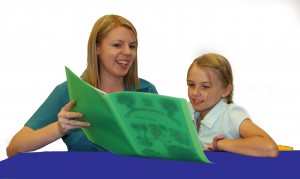
Sometimes children get very good at using their new speech sounds in therapy sessions and at home when doing their speech practice but forget to use their new sounds in everyday conversation. The ŌĆ£Fixed-up-one routineŌĆØ is a strategy designed to help with this that can be used by parents to help their children in a positive way to remember their new sounds.
ŌĆ£Fixed-up-one RoutinesŌĆØ were developed and introduced to the speech pathology community by Caroline Bowen, a speech pathologist who specialises in childhood speech development. You can read more about CarolineŌĆÖs work on ŌĆ£Fixed-up-one RoutinesŌĆØ directly from her website at http://www.speech-language-therapy.com/tx-self-corrections.html
The ŌĆ£Fixed-up-onesŌĆØ routine teaches children to notice they have made a mistake and then have a try at fixing it. The routine is also valuable for providing a way for adults to talk to children about their errors in a positive, non judgemental way. Praising a child who notices an error and has a try at ŌĆ£Fixing the wordŌĆØ is a very positive way of helping the child to ŌĆśownŌĆÖ their speech. When children are familiar with the routine it also makes it easy for adults to cue the child to have another try at the word with a comment such as ŌĆ£thatŌĆÖs got your new sound in it, I wonder if you can ŌĆ£fixŌĆØ that one up?ŌĆØ
Caroline says this about self corrections: ŌĆ£Adults continually make little mistakes when they speak. They barely notice these mistakes at a conscious level, and quickly correct themselves, and go on with what they are saying. This process of noticing speech mistakes and correcting them as we go is called making revisions and repairs, or self-corrections. Many children with speech sound difficulties are not very good at self-correcting. They find it difficult to monitor their speech (i.e., listen to it critically) and make correctionsŌĆØ
Examples of when you can use Fixed Up One Routines are available on CarolineŌĆÖs website. Remember to point out some revisions and repairs in your own speech, and to praise when the child uses the strategy all by themselves.
There is more information about speech development and some printable games on the resource page of Our website. We also have a constantly growing collection of speech information and activities on our pintrest page.Some other ideas to help your child transfer their ŌĆśnewŌĆÖ sounds into conversation are:
Ask your child to make a phone call, either using a real or pretend phone, to order a pizza, or talk to a friend or relative. Have a practice first and listen for the use of the ŌĆśnewŌĆÖ sound.
Make up stories about a topic or silly character that includes the childŌĆÖs target sound (e.g. fat Freddy found it hard to find his fish).
If you go to visit a friend, ask your child to try and remember to use their ŌĆśnew wayŌĆÖ of talking while they talk to the friend.
When going for a walk, try to find things that start with their ŌĆ£new soundŌĆØ. To make it more fun you can keep score of who finds the most things.
Ask your child to pass messages to other family members or friends using their ŌĆ£new soundŌĆØ.
Practice with songs and rhymes that contain the childŌĆÖs special sound.
Include practice in the everyday tasks that you do e.g. driving in the car, in the bath, at the dinner table, during their evening story.
Reward your child for remembering to use the sound at school, their teacher can be enlisted to help keep track.
Some children benefit from having a visual reminder to use their ŌĆśnew soundŌĆÖ. Some agreed upon symbol can be placed around the house, or worn on a bracelet to help your child remember to use their new sound.
Use a star chart to record when you hear their sounds in conversational speech with a reward when the child fills their chart.
Remember to provide positive encouragement when your child uses the sound spontaneously e.g. ŌĆ£great, I had lots of ŌĆ£newŌĆØ sounds when you were talking thenŌĆØ. Gradually reduce the frequency of the rewards and reinforcements as the sound becomes a natural part of your childŌĆÖs speech.
If you are concerned about your child's speech development check Our website to find out what is expected at your child's age and how speech pathology can help if needed.
Related Posts:
Is my child's speech just lazy?
Top 10 speech ideas
Speech disorders
Goodbye Mr Tongue
What is dyspraxia?
Related Blog Posts
If you liked this post you may also like:
Taking Turns
Developing story writing
Fun with pretending
What is Dyspraxia?



